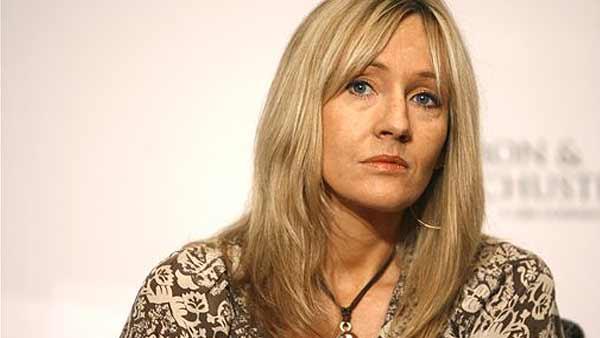1. J.K. Rowling Isn’t a Real Person
A rags-to-riches story about an impoverished woman who penned seven lengthy novels in ten years, sold over 250 million copies, and is now worth more than $800 million? That kind of success is harder to believe than magic. A Norwegian director named Nine Grunfeld posits that, in fact, we shouldn’t believe it at all. Supposedly Bloomsbury and Warner Bros. have been pulling the wool over our wide eyes for the past decade by conjuring up this J.K. Rowling figure. According to Grunfeld, a poor woman in a coffee shop didn’t write the Harry Potter series; instead, a team of writers and advertisers came together to create a meticulously crafted, hyper-slick franchise with wide appeal. And as for the woman who shows up to sign books and walk the red carpet? Well, that’s just a paid actress of course. Have we all been duped by a powerful marketing spell?
2. The KGB killed Albert Camus for criticizing the USSR
Camus publicly denounced a Soviet foreign minister and angered Moscow by supporting the writer Boris Pasternak after Stalin had banned him. Camus’ official reason for death was a car accident in Sens, a small town in northern France. Jan Zábrana, a Czech poet and translator, however, claimed that the KGB used a special technology to puncture the tire of Camus’ car causing him to fatally crash.
In his book Celý život, Zábrana writes, “I heard something very strange from the mouth of a man who knew lots of things and had very informed sources. According to him, the accident that had cost Albert Camus his life in 1960 was organized by Soviet spies. They damaged a tire on the car using a sophisticated piece of equipment that cut or made a hole in the wheel at speed…The order was given personally by [Dmitri Trofimovic] Shepilov [the Soviet foreign minister] as a reaction to an article published in Franc-tireur [a French magazine] in March 1957, in which Camus attacked [Shepilov], naming him explicitly in the events in Hungary.” Giovanni Catelli, an Italian poet and professor, noticed that this paragraph was the only paragraph missing in the Italian translation of Zábrana’s book. How odd.
3. F. Scott Fitzgerald Stole Material from His Wife, Zelda
Zelda once poignantly accused Scott of stealing her genius, writing, “You have picked up crumbs I have dropped for ten years, too.”
Academics actually have a good deal of evidence that Scott used bits and pieces of Zelda’s letters and journal entries in his novels. In fact, one of their most intense fights regarded which of them should be allowed to write about her struggles with mental illness and their relationship célèbre. In fact, this fight was written down by a stenographer, and all 114 pages can now be found in Princeton’s archives.
However, some, like Hemingway, felt that if anything it was Zelda who was taking from Scott. Hemingway thought she was a third-rate writer, able to get published only by riding on her husband’s coattails. However, I wonder if Ernest ever got around to reading Save Me the Waltz, Zelda’s gorgeous semi-autobiography.
4. Dorothy Is a Witch
Before it was a film, The Wonderful Wizard of Oz was book. Written by L. Frank Baum and published in 1900, the fantasy children’s book had Dorothy going off on a wonderful adventure through a land called Oz. But think about what she actually did on that trip, and it might seem that she was in fact a sort of witch. She brings to life a scarecrow and an empty suit of armor. She controls flying monkeys and feral animals, and she uses magical slippers to return herself to Kansas. The Wicked Witch of the West should be impressed with Dorothy’s apparent sorcery.
5. Harry Dreamed Up Hogwarts to Cope with Abuse
Whether J.K. Rowling or a group of super-writers conjured up the Harry Potter series doesn’t really matter to Karl Smallwood at Cracked. He posits that a child like Harry — emotionally neglected, forced to live in a cupboard — escaped into a fantasy world to cope with this abuse. He claims that the abuse was also physical, considering Harry went to the infirmary at least six times throughout the series. Although most of his classmates are hospitalized for almost whimsical conditions (“skin complexion altered to resemble cornflakes”), Harry suffers from a cracked skull or broken arm — more human injury, possibly caused by abuse.
6. Branwell Brontë wrote Wuthering Heights
Fantasy author Clare Dunkle says that Emily Brontë didn’t write her masterpiece, Wuthering Heights. Rather, her chef d’oeuvre was penned by her brother and she merely took the credit. The claim is that Bramwell went to pub with friends and read bits of his novel he was working on to them. Then, after Wuthering Heights and Emily became well known, these same men said that it included the very same parts that Bramwell had once read to them. Was it just a case of drunken forgetfulness or were they onto something?
7. Shakespeare Didn’t Write His Plays
The uneducated son of a wool-smuggler and a glover shouldn’t have been able to write such complex plays, so how can we explain it? Some say it’s easy: someone else wrote them. The main possibilities for the “true” writers of the Shakespeare canon are Christopher Marlowe, Edward de Vere, and Sir Francis Bacon. De Vere died before Macbeth and The Tempest were written though. Marlowe also died before most of the works were completed (killed in a bar fight), but some claim he actually survived. As for Bacon, he was alive all throughout, and even Mark Twain thought it plausible, claiming that you could find the words “Francisco Bacono” cryptically hidden in Shakespeare’s First Folio.
8. The Great Gatsby’s Nick Carraway is Gay and in Love with Gatsby
The narrator, who leads us through the vibrant, but ultimately superficial world of Gatsby, Tom, Daisy, and the gang, might have actually been deeply in love with the titular character in The Great Gatsby. The fact that many think F. Scott Fitzgerald might have been gay (unable to sexually please his wife, Zelda; allegedly comparing “baguettes” with Hemingway in a café washroom) somewhat plays into this theory, but the real evidence is in the text. Greg Olear over at Salon first conjured this theory, and he points first to Nick’s description of female characters.
When Nick regards Jordan Baker, the famous golfer who he’s implicitly set up with, he writes:
“I enjoyed looking at her. She was a slender, small-breasted girl, with an erect carriage, which she accentuated by throwing her body backward at the shoulders like a young cadet. Her gray sun-strained eyes looked back at me with polite reciprocal curiosity out of a wan, charming, disconcerted face.”
His description of Jordan is more akin to that of a man, and, based on her physique and wit, is actually quite hot. Nick doesn’t see her this way though. Then compare that to his description of Tom Buchanan, a man whom he does not even like:
“Not even the effeminate swank of his riding boots could hide the enormous power of that body — he seemed to fill those glistening boots until he strained the top lacing, and you could see a great pack of muscle shifting when his shoulder moved under his thin coat. It was a body capable of enormous leverage — a cruel body.”
Or his loving description of Gatsby:
“He smiled understandingly — much more than understandingly. It was one of those rare smiles with a quality of eternal reassurance in it that you might come across four or five times in your life. It faced — or seemed to face — the whole external world for an instant, and then concentrated on you with an irresistible prejudice in your favor. It understood you just as far as you wanted to be understood, believed in you as you would like to believe in yourself, and assured you that it had precisely the impression of you that, at your best, you hoped to convey.”
As far as romantic descriptions, this is essentially the pinnacle in The Great Gatsby.
Most tellingly however, Olear points to an often forgotten passage, where it seems Nick went home with a “Mr. McKee” at Myrtle’s rollicking apartment party when she comes into town with Tom. Fitzgerald never employs ellipses (implying missing action) anywhere except here, and he writes:
“Come to lunch someday,” he suggested, as we groaned down in the elevator. “Where?” “Anywhere.” “Keep your hands off the lever,” snapped the elevator boy. “I beg your pardon,” said Mr. McKee with dignity, “I didn’t know I was touching it.” “All right,” I agreed, “I’ll be glad to.”
…I was standing beside his bed and he was sitting up between the sheets, clad in his underwear, with a great portfolio in his hands. “Beauty and the Beast… Loneliness… Old Grocery House… Brook’n Bridge…” Then I was lying half asleep in the cold lower level of the Pennsylvania Station, staring at the morning Tribune, and waiting for the four o’clock train.”
Although Fitzgerald doesn’t overtly tell us, it certainly seems Nick slept with Mr. McKee. Why is this important? Well if Nick was gay and in love with Gatsby then perhaps he made Gatsby out to be a much better man than he actually was. Objectively, he’s a superficial man who continually tries to steal Daisy, a married woman. In Nick’s eyes, however, he’s a kind-hearted, perpetual dreamer, who deserved Daisy far more than Tom.
http://thoughtcatalog.com/cody-delistraty/2013/12/j-k-rowling-isnt-real-and-7-other-literary-conspiracies/






































